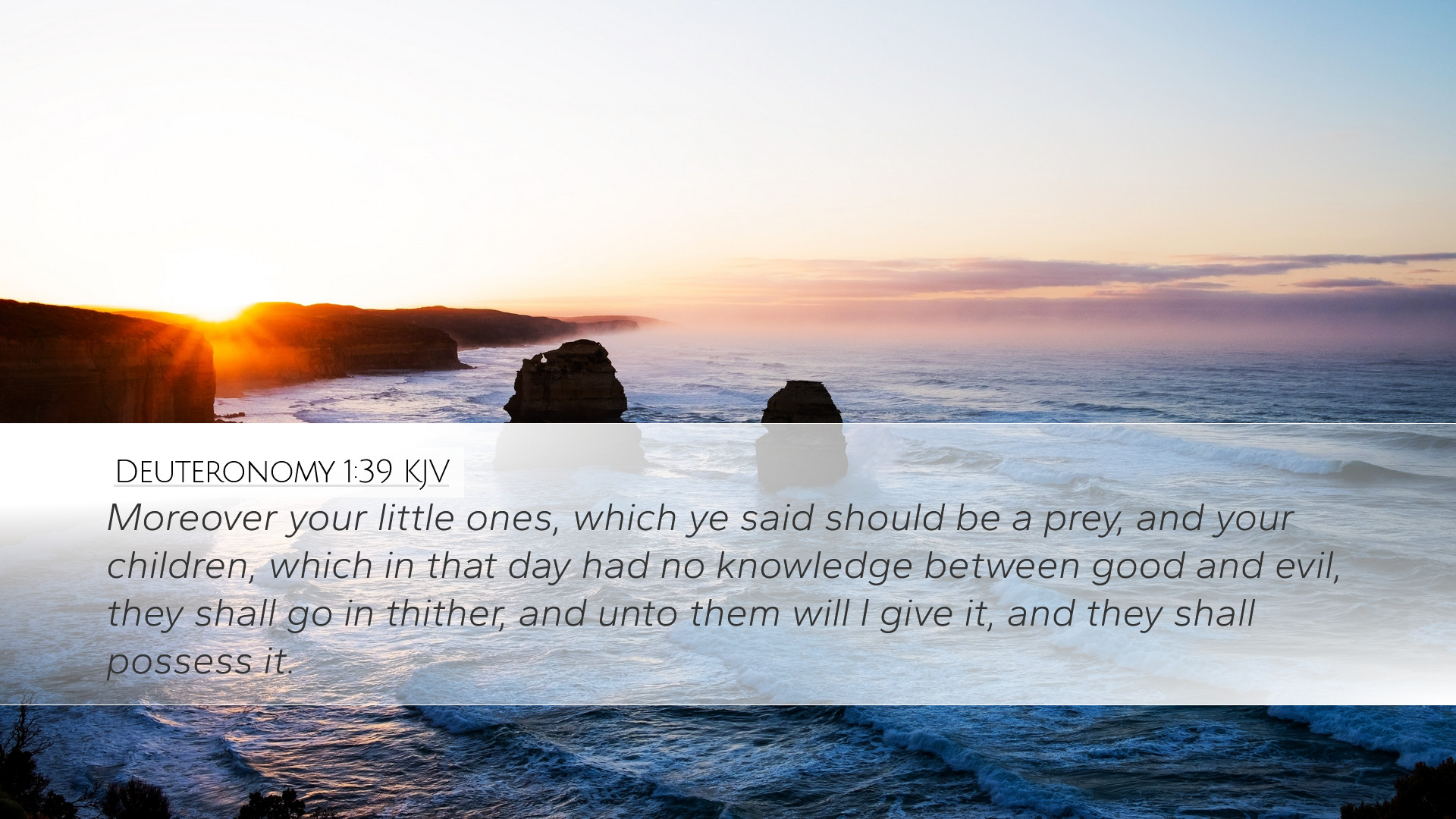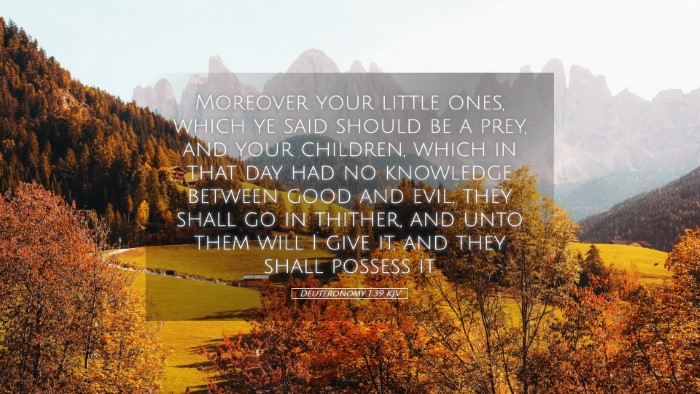Commentary on Deuteronomy 1:39
Verse Text: “And your little ones, which ye said should be a prey, and your children, which in that day had no knowledge between good and evil, they shall go in thither, and unto them will I give it, and they shall possess it.”
Introduction
Deuteronomy 1:39 is a significant verse that reveals God's response to Israel's rebellion and His enduring faithfulness to the innocent. This passage addresses the consequences of Israel's lack of faith and the grace extended to the next generation.
Contextual Background
The book of Deuteronomy serves as a farewell address by Moses, reiterating the laws and covenant before the Israelites enter the Promised Land. The context surrounding this verse encompasses the Israelites' lamentation and fears after receiving a discouraging report from the spies sent to scout the land of Canaan. Their rebellion against the Lord’s command led to severe implications, notably the decision that the current adult generation would not enter the Promised Land.
Commentary Insights
Matthew Henry’s Perspective
Matthew Henry emphasizes the merciful provision of God for the next generation, highlighting that even amidst judgment, God’s mercy shines through. He points out that the little ones, referred to as those without knowledge of good and evil, are seen as innocent and thus favored by God to inherit the land.
- Divine Mercy: Henry notes the mercy of God, in allowing those deemed innocent, the children, to enter the Promised Land, demonstrating that God's plans transcend human failure.
- Faith of the Innocent: He also posits that it is the faith and purity of heart of the children that God honors, emphasizing that they shall inherit what their parents have forfeited.
Albert Barnes’ Commentary
Albert Barnes draws attention to the distinction between those who are accountable for their actions and those who are not. He interprets the phrase "which had no knowledge between good and evil" as referring to children who cannot yet discern moral complexities.
- God’s Justice and Judgement: Barnes argues that this verse showcases God's justice, as He punishes the adults for their disbelief while sparing the children, underscoring the theme of justice intertwined with mercy.
- Future Hope: He points out that the children represent hope for future generations, indicating that God’s promises remain valid for those who trust in Him, irrespective of parental failures.
Adam Clarke’s Analysis
Adam Clarke provides a detailed theological reflection on the implications of this verse regarding the nature of God and His covenantal faithfulness. He stresses the significance of God's grace.
- Importance of the Covenant: Clarke highlights that this moment reflects God's unwavering commitment to His covenant, affirming that even in judgment, God preserves a remnant for Himself.
- Theological Implications: Clarke’s analysis suggests a deeper theological implication, proclaiming that God’s gracious actions toward the innocent serve as a prelude to the New Covenant, where grace abounds abundantly for all who believe.
Theological Themes
In studying this verse, several theological themes emerge:
- Abundant Grace: The verse illustrates the concept that despite human failure, God’s promises continue, focusing on the unshakable foundation of grace.
- Innocence in Judgment: God's distinction between adults and children in this passage raises questions about accountability and the nature of original sin.
- Hope for Future Generations: The inheritance of the land by the next generation symbolizes hope and the idea that future generations can rise above the failures of their predecessors.
Practical Application
For pastors, students, and theologians, Deuteronomy 1:39 provides profound insights into God’s character and expectations:
- Teaching Grace: This passage can remind leaders to teach about God’s grace and mercy, encouraging communities to trust in God’s faithfulness.
- Focus on the Next Generation: It reinforces the importance of nurturing faith in children, acknowledging their value in God's plan for redemption.
- Covenantal Relationship: Understanding the covenant relationship should motivate pastoral care and teaching, focusing on how God’s promises shape our understanding of success in the Christian life.
Conclusion
Deuteronomy 1:39 encapsulates the tension between divine judgment and mercy, illustrating that while God holds individuals accountable, He also preserves and provides for those who are innocent. This verse not only serves as a historical account but also as an eternal reminder of God’s unwavering faithfulness to His covenant, even in the face of human rebellion.


